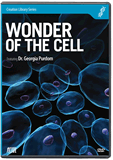Rip van Microbe
LiveScience: “Microbe Wakes Up After 120,000 Years” After tens of thousands of years trapped in ice, an ancient species “wakes up.” Is it science news or the plot of a low-budget movie?
A team from Penn State University has purportedly revived bacteria found two miles (three kilometers) beneath a Greenland glacier. Based on the depth of the ice, the team believes the bacteria to be some 120,000 years old.
The bacteria provide an example, say the scientists, of how bacteria-like life-forms could survive on hostile planets.
Noting the harsh conditions many bacteria can survive, team member Jean Brenchley said, “They could’ve been dormant, or they could’ve been slowly metabolizing, but we don't know for sure.” In either case, the bacteria were stimulated to normal growth by incubating the bacteria at 36˚F (2 C) for seven months, after which the heat was turned up to 41˚F (5 C) for four months. “We were able to recover it and get it to grow in our laboratory. It was viable,” Brenchley explained.
Named Herminiimonas glaciei, the bacteria provide an example, say the scientists, of how bacteria-like life-forms could survive on hostile planets. “These extremely cold environments are the best analogues of possible extraterrestrial habitats. The exceptionally low temperatures can preserve cells and nucleic acids for even millions of years,” said team member Jennifer Loveland-Curtze.
In related news, LiveScience reports on research into the oldest that life could possibly be (within the big bang / evolution model). Concluding that life could be as old as its constituent “biogenic elements,” the scientists are investigating the big bang model of element formation to determine the earliest date all of the elements might have existed. Based on models with mostly hypothetical parameters, they conclude that it only took between 100 and 500 million years after the big bang before life may have been possible.
Both of these news stories concern evolution-presuming research that shares a major flaw: ignoring how life itself could have originated. In the research on H. glaciei, the scientists are eager to imagine hardy bacteria thriving on desolate, far-flung planets. But they ignore the fundamental question of how life could have formed on such planets. Likewise, the research on the elements necessary for life seems to presume that wherever such biogenic elements are, life will quickly follow. The implication is that “life” is just a random, disorganized collection of the right elements mixed together. With each century humans have discovered how incorrect that idea is.
In fact, this flaw extends to almost all evolutionary research. Faced with the impossibility of life’s components randomly self-organizing into a sophisticated, microscopic factory (complete with mini-machines, instructions and decoders, defense systems, and so on), evolutionists throw out wild ideas but claim “we’ll figure it out someday.” Until that hypothetical day, however, every evolutionary research program—and every evolutionary researcher—takes on faith that the great miracle of materialism occurred: that life spontaneously self-organized against all odds.
For more information:
Remember, if you see a news story that might merit some attention, let us know about it! (Note: if the story originates from the Associated Press, Fox News, MSNBC, the New York Times, or another major national media outlet, we will most likely have already heard about it.) And thanks to all of our readers who have submitted great news tips to us.
(Please note that links will take you directly to the source. Answers in Genesis is not responsible for content on the websites to which we refer. For more information, please see our Privacy Policy.)
Recommended Resources

Answers in Genesis is an apologetics ministry, dedicated to helping Christians defend their faith and proclaim the good news of Jesus Christ.
- Customer Service 800.778.3390
- © 2024 Answers in Genesis






